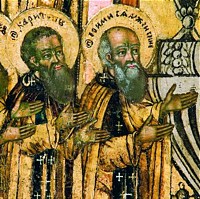
The Monk Evphymii and his disciple the Monk Khariton asceticised at the River Syanzhema during the close of the XV to the beginning XVI Centuries. The Monk Evphymii came to the Spasokamensk monastery from the Volokolamsk outskirts. For a long time he continued as a novice-obedient at the monastery, but later he settled on the eastern shore of Lake Kuben near the mouth of the River Kushta. Amidst the impenetrable swamps and dense woods there, the saint built himself a small cell, wherein he asceticised in total solitude. After a certain while there came to him the Monk Alexander of Kushtsk (+ 1439, Comm. 9 June), who also had set out from the Spasokamensk monastery and at first settled at the River Syanzhema. The Monk Alexander besought the Monk Evphymii to switch cells with him, since he was seeking a place of complete quiet.
Transferring himself over to the River Syanzhema, the Monk Evphymii did not refuse the local people his spiritual counsel and guidance. And there too the Monk Khariton came to him.
The Monk Evphymii built a church in honour of the Ascension of Christ and made next it a monastery. At Rostov, under Sainted Archbishop Dionysii (1418-1425), he received the permission to build, and evidently, he also received there the priestly dignity and was made hegumen of the monastery started by him.
Both monks were an example to the brethren in prayer, and in the works of construction and supervision. They made do with such food and clothing, as even the brethren reckoned worthless. In temple the Monk Evphymii stood in fear and trembling, and the brethren often saw upon his face tears of tenderness. Working at hand-crafts, the monk always sang psalms. The Monk Evphymii died in about the year 1465, though the actual day of his death is unknown.
His successor as hegumen was his beloved disciple – the Monk Khariton. For more than 40 years he continued the work at the monastery, and he died in old age on 11 April 1509. Both monks were buried at the Ascension church. The memory of the Monk Evphymii is celebrated also on 20 January, and that of the Monk Khariton on 28 September, on the days of their saints-names in common.
Back

 The Monk Evphymii and his disciple the Monk Khariton asceticised at the River Syanzhema during the close of the XV to the beginning XVI Centuries. The Monk Evphymii came to the Spasokamensk monastery from the Volokolamsk outskirts. For a long time he continued as a novice-obedient at the monastery, but later he settled on the eastern shore of Lake Kuben near the mouth of the River Kushta. Amidst the impenetrable swamps and dense woods there, the saint built himself a small cell, wherein he asceticised in total solitude. After a certain while there came to him the Monk Alexander of Kushtsk (+ 1439, Comm. 9 June), who also had set out from the Spasokamensk monastery and at first settled at the River Syanzhema. The Monk Alexander besought the Monk Evphymii to switch cells with him, since he was seeking a place of complete quiet.
The Monk Evphymii and his disciple the Monk Khariton asceticised at the River Syanzhema during the close of the XV to the beginning XVI Centuries. The Monk Evphymii came to the Spasokamensk monastery from the Volokolamsk outskirts. For a long time he continued as a novice-obedient at the monastery, but later he settled on the eastern shore of Lake Kuben near the mouth of the River Kushta. Amidst the impenetrable swamps and dense woods there, the saint built himself a small cell, wherein he asceticised in total solitude. After a certain while there came to him the Monk Alexander of Kushtsk (+ 1439, Comm. 9 June), who also had set out from the Spasokamensk monastery and at first settled at the River Syanzhema. The Monk Alexander besought the Monk Evphymii to switch cells with him, since he was seeking a place of complete quiet.